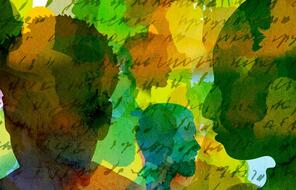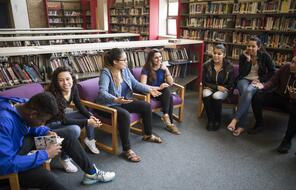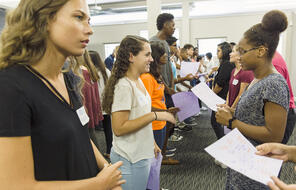Resource Library
Find compelling classroom resources, learn new teaching methods, meet standards, and make a difference in the lives of your students.
We are grateful to The Hammer Family Foundation for supporting the development of our on-demand learning and teaching resources.

Introducing Our US History Curriculum Collection
Draw from this flexible curriculum collection as you plan any middle or high school US history course. Featuring units, C3-style inquiries, and case studies, the collection will help you explore themes of democracy and freedom with your students throughout the year.
3350 Results
Identity and Storytelling
Designed for students in grades 9-10, this text set includes lesson plans and multi-genre texts for a 1–2 week unit exploring the essential question, "What makes me, me?"
Establishing Opening and Closing Routines
These opening and closing classroom routines will set a welcoming tone, allow students to connect with one another, and encourage goal setting.

Holocaust and Human Behavior
Explore the digital version of our core resource on the Holocaust. Find classroom-ready readings, primary sources, and short documentary films that support a study of the Holocaust through the lens of human behavior.

Spanish Translations from Holocaust and Human Behavior
Get Spanish-language versions of popular readings from Holocaust and Human Behavior.

Teaching Holocaust and Human Behavior
Use this 23-lesson unit to lead middle or high school students through a study of the Holocaust that asks what this history can teach us about the power and impact of choices.

My Part of the Story: Exploring Identity in the United States
Help students understand that their voices are integral to the story of the United States with six lesson plans that investigate individual and national identity.

Community Matters: A Facing History & Ourselves Approach to Advisory
Our advisory curriculum for grades 8–10 contains a year’s worth of activities, handouts, and best practices for establishing inclusive communities where students can engage in honest discussions and build their voices.

Identity & Community: An Introduction to 6th Grade Social Studies
Intentionally designed for middle school classrooms, this unit explores themes of identity and community by using students' knowledge of the Memphis, Tennessee, community.

Teaching Mockingbird
Learn how to incorporate civic education, ethical reflection and historical context into a literary exploration of Harper Lee's novel, To Kill A Mockingbird.

Climat Scolaire
Les ressources de cette catégorie sont destinées à vous aider à créer un climat bienveillant en classe avec les jeunes afin de vous permettre d’aborder plus facilement des sujets sensibles et délicats d’une façon visant à renforcer les valeurs et principes de la démocratie.

Teaching Mockingbird Media and Readings
Enrich your teaching of To Kill a Mockingbird with this set of videos, photographs, and readings that will help students contextualize the novel.



